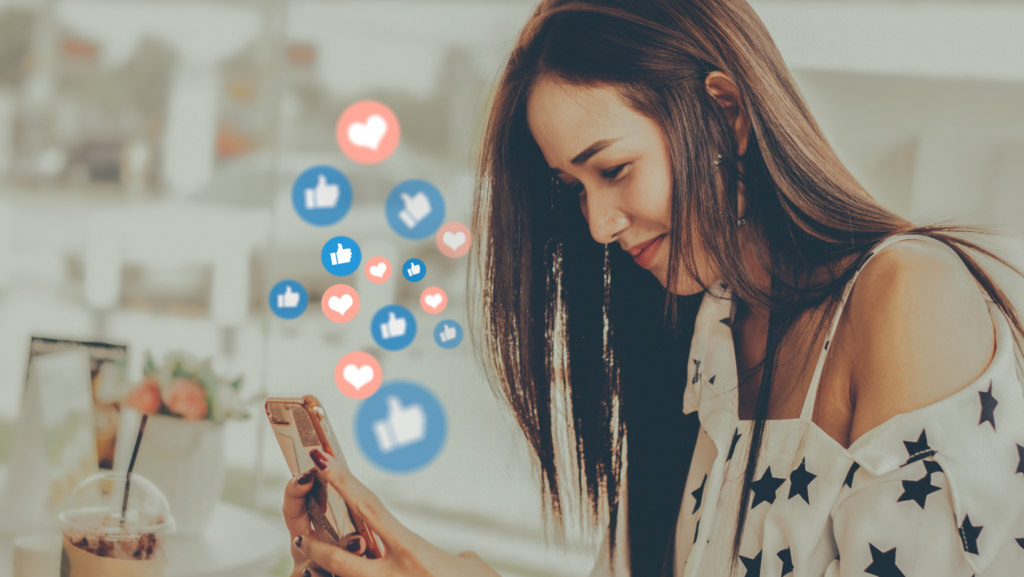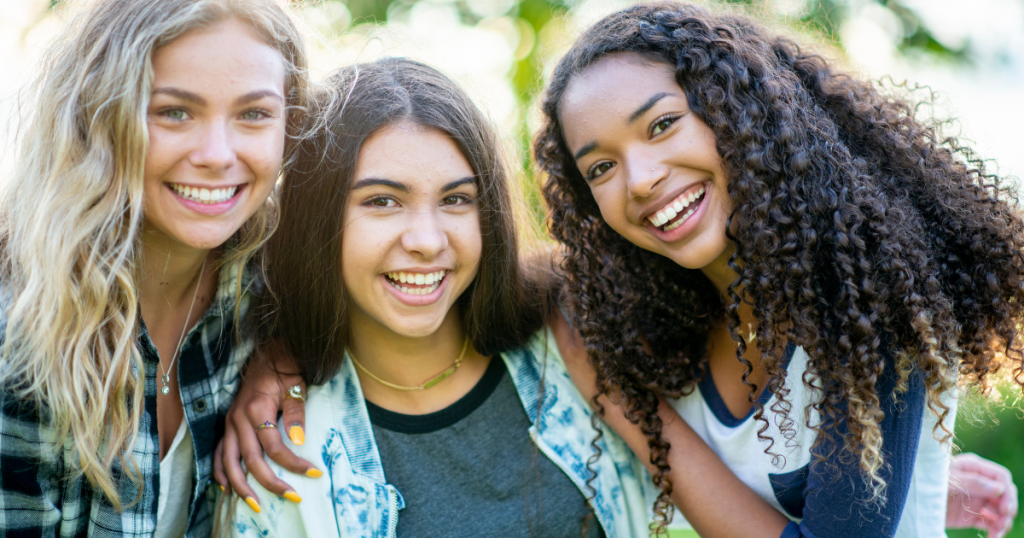Be honest. Is social media affecting your body image? Do you find yourself masking your true feelings behind a heart emoji? Pretending your peripheral vision doesn’t catch a comparative glance at the red-carpet and beach bodies vying for your eye-time?
Unless you live in a bunker, the answer is probably yes.
Social media has rapidly become front and center in our lives. It’s changed how we interact with each other and with the world around us.
It’s now THE way people communicate, access information, and present themselves to the world.
And it’s not just the tweens and teens doing it!
Since social media began dominating our daily lives, its impact on how we view our bodies and ourselves has come into clear view.
The constant barrage of perfect bodies has a devastating impact on the self-esteem and mental health of millions of people.
Body image has been a concern for people for centuries. Pressure to conform to standards of beauty has existed for as long as history has been recorded.
However, prior to social media, the influence on body image was very different.

Images on social media (and before that, in print ads) are often filtered and digitally altered. What is presented as ‘normal’ strengthens unrealistic beauty standards that are impossible for most people to achieve.
Add in the industry preference for youth, and the subliminal warping of body image and planting of unrealistic expectations is off to the runway.
Such narrow definitions of beauty are harmful, even dangerous.
So what can we do?
Well, let’s first understand how social media influences body image.
One of the primary ways social media affects body image is by idealizing and spreading unrealistic beauty and body standards.
Idealized cultural ideals
Social media affects body image by featuring idealized images of bodies. This often leads to comparisons between “perfect” (although altered) imagery and one’s own body.
Because content on social media is usually filtered and stylized, images of bodies aren’t real.
In other words, viewers aren’t dealing with reality.
Sadly, one side is content to sell a fantasy, and the other side is content to buy into it.
Of course this has a profound impact on how we perceive our bodies and our worth.
It’s like a sick game of visual gaslighting. You know cognitively when a face or body doesn’t look natural or real, but you can’t “prove” it.
You may not even understand the allure, the attention, the following.
But you’re powerless to stop it.
And we all know the saying, If you can’t beat ‘em, join ‘em.
There’s no denying that body image and social media are interconnected.
Consider the following vignette:

Amy, a 16-year-old girl, spends every free moment she has scrolling through social media feeds. Without even recognizing it, she compares herself to the images she sees. Instagram, TikTok, Snapchat….She doesn’t even bother closing apps because she will be back soon.
The constant stream of seemingly perfect bodies on social media platforms only deepens her feelings of body hate and low self-worth.
She is convinced she has to change her appearance in order to fit in. She begins to obsess over how she looks.
Despite her efforts, she never believes she looks like any of the filtered images.
The constant comparison to idealized images that Amy sees on social media has taken a toll on her mental health.
She has essentially been brainwashed to believe a myth: that the bodies she sees on her screen are the norm.
And, as if that’s not enough, she is manipulated into believing that she, too, can look like that if only she tries harder.
Amy’s story is common. It illustrates the negative impact social media can have on body image and self-esteem.
Social media’s unrealistic beauty standards cause people to feel inadequate and to believe they need to change their appearance to be attractive and accepted. Feelings of inadequacy and dissatisfaction then infiltrate.
Why and how?
Before social media, people had to actively seek out images and messages about beauty, whereas now they are constantly bombarded with them.
Social Comparison
A specific way social media affects body image is through social comparison.
People compare their bodies to those of others online, striving to emulate their bodies and lifestyles.
“If I can look like (fill in the blank), then maybe I can live and feel like she does, too.”
It is so easy to compare ourselves to manipulated images and to then feel inferior. The desire to look “perfect” often leads to an obsession with diet and exercise, which then has negative consequences for physical and mental health.
And can we just acknowledge a loud but unspoken truth in this madness? Constant comparison to others is emotionally draining.
This relentless predation via falsified images leads to eating disorders, body dysmorphia, and other body image concerns. Mental and physical health take a nosedive, resulting in anxiety, depression, and a range of other health problems.
Body-shaming
In addition to unrealistic beauty standards and social comparison, social media is also a breeding ground for body-shaming.
Anonymous posts with insults about others’ bodies are widespread. Talk about mixing the pot of shame, embarrassment, and low self-esteem!
Body-shaming can also lead to body dysmorphia, eating disorders, and other body image issues.
Social media’s impact on body image can be harsh.
It often leads to unrealistic beauty standards, negative social comparison, and body-shaming, all of which can have a significant impact on self-esteem and mental health.
You and I are bombarded with images of FAKE idealized bodies DAILY. What we see is heavily filtered and digitally altered.
The result? An unattainable reality.

Social media images leave us feeling like crap — inadequate, unworthy, and full of self-doubt.
The impact of unrealistic beauty standards is deeply personal. Instead of being grateful for our bodies, we succumb to the feelings of shame and inadequacy that lead us to believe our bodies are never enough.
A call to action regarding social media affecting body image: what needs to change and how to change it.
Be mindful of content on all social media platforms. Whom are you following? Curate your feed!
Cultivate a healthy body image by focusing on your own strengths and unique qualities.
Negative comments and insults about others’ bodies can be posted anonymously and cause harm to anyone on the receiving end — even celebrities.
While social media can provide a platform for connection and self-expression, it can also contribute to feelings of self-doubt and insecurity. And no one is immune.
Focusing on your own strengths and unique qualities will help to cultivate a body that celebrates diversity and individuality.
There is a way to strike a balance between being active on social media and engaging with content that promotes body respect and overall well being.
The following are steps that can be helpful or unhelpful in promoting positive body image and healthy social media use.
Promoting positive body image and healthy social media use requires a combination of self-care, positive self-talk, and mindful interaction with social media.
By limiting exposure, reframing negative thoughts, and focusing on body positivity, you can improve your relationship with both your body and social media.
Consider taking these 5 steps toward countering the effects of social media on body image:
- Social media exposure: Limit your time on social media. You will likely reduce feelings of comparison and inadequacy. Set specific times for checking social media and limit the number of daily visits.
- Body-positive accounts: Follow accounts that promote body positivity, self-love, and diversity to help counteract harmful messages. Seeing diverse bodies and messages of self-acceptance can have a powerful impact.
- Self-care: Engage in self-care activities such as exercise, mindfulness, and spending time with loved ones Taking care of your own physical and emotional needs promotes a positive body image.
- Negative thoughts: Challenge negative thoughts about your body and focus on the positive. Instead of criticizing your appearance, focus on the things that make you unique. YOU define you.
- Supportive People: Surrounding yourself with friends and family members who encourage self-acceptance can significantly impact body image. Seeking support from loved ones and a therapist can also be helpful.
And be careful not to:
- Compare yourself to others on social media. Comparisons contribute to negative body image.
- Believe everything on social media. Doing so sets you up for unrealistic expectations and negative body image.
- Engage in disordered eating behaviors that social media encourages. These behaviors lead to negative body image and health consequences.
- Neglect self-care. Ignoring your own needs can contribute to negative body image and diminished overall well-being.
Social media does not need to define our self-worth. By taking steps, you really can improve your relationship with social media and body image.
The journey toward a more neutral or even positive body image is personal. Everyone moves at their own pace.

With patience, compassion, and persistence, you can learn to love and appreciate your body again. Promote body positivity and diversity by celebrating bodies of all shapes, sizes, and colors. It’s the first step to breaking down the narrow definition of beauty so often portrayed on social media.
But how?
Highlight and amplify diverse voices and perspectives. And seek out and engage with content that promotes body positivity.
Another way to create a more supportive environment is by being mindful of language on social media.
Words can be powerful, and it’s important to use them in a way that’s inclusive. So please avoid negative language about bodies and instead use language that promotes self-acceptance.
It’s also important to engage in self-care and limit your exposure to social media. The constant barrage of images and messages can be overwhelming and lead to anxiety and stress.

Take regular breaks from social media, practice mindfulness, and surround yourself with supportive people who can help to counteract negative effects of social media on body image.
Finally, we can work toward creating a more supportive environment by being allies and advocates for change.
A more supportive environment for body image on social media is a shared responsibility.
By promoting body neutrality or positivity, being mindful of language, engaging in self-care, and advocating for change, we can create a more inclusive and supportive environment on social media.
Let’s work together to create a world where everyone feels valued and loved for who they are, regardless of the size, shape, or color of their body.
Dr. Elayne Daniels is an international coach, consultant, speaker, and psychologist based in Boston. She’s helped hundreds of people with body image concerns. To learn more about how she can help you, contact her here.
To read more about Body Image, check out her blog here.


